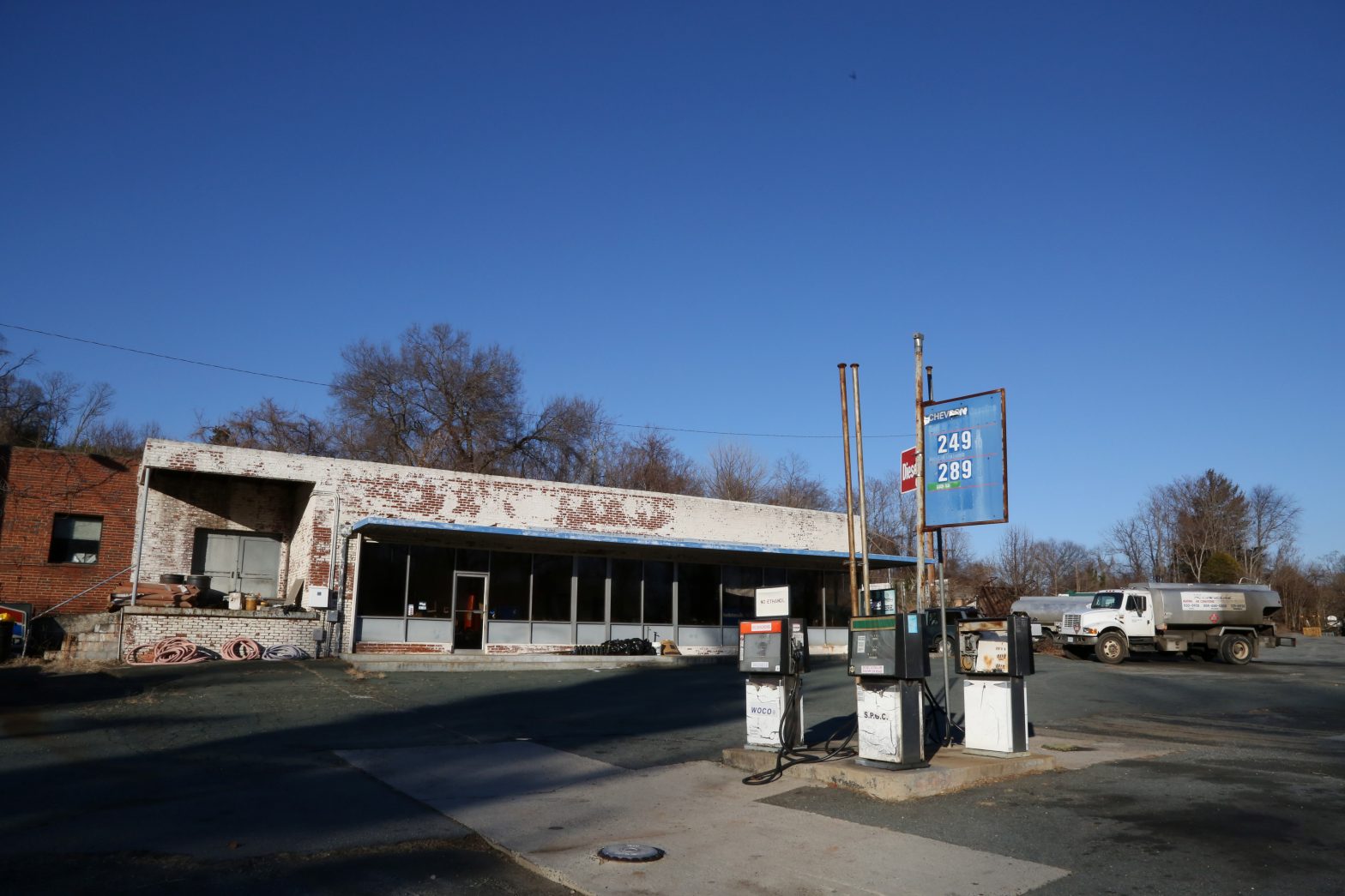For decades, two of Albemarle’s toniest enclaves—Farmington and Ednam Forest—have lived in proximity to a less desirable neighbor. Charlottesville Oil, built in 1950, has long been known for the junked vehicles and debris outside. And inside, when it rained, it poured.
Albemarle County finally noticed. On April 22, it sent Charlottesville Oil president James F. “Phil” Dulaney Jr. a preliminary determination that “the property at 2839 Ivy Road is blighted.” Among the 10 violations cited are “overall lack of any or no maintenance to the building and outside property,” holes in the roof and floor, hazardous materials, mold and mildew, “unsanitary conditions” inside the building, and no heat for employees.
That was followed by an April 27 letter from county Assistant Fire Marshal Micaiah Ledford, who noted “continuing violations” of fire codes, as well as local and state statutes. He set out a timeline for hazardous materials cleanup, asbestos abatement, and demolition permits for unsafe structural sections.
On July 13, county Zoning Administrator Bart Svoboda sent Dulaney an official notice of violation. He listed the accumulation of tires and trash, multiple inoperable vehicles, structures, and a roofing contractor whose business was not a permitted use. Svoboda warned Dulaney the violations could be subject to criminal and civil penalties, and to bring the property into compliance by August 15.
Albemarle’s deadline for compliance has been extended because Charlottesville Oil is “making forward progress,” says county spokesperson Emily Kilroy, who clarifies that the property has not been condemned. The county has taken the owners of blighted properties to court, but “that’s not where we want to be,” she says, noting the cost to taxpayers. “The opportunity to address real safety and health issues is a better outcome.”
The fire marshal was involved, she explains, because “unsafe structures pose huge risks to firefighters.”
In an emailed statement, Dulaney says, “We have completed the asbestos removal phase and are coordinating with Albemarle County to take down what needs to be taken down and fixing up what needs to be fixed up. We look forward to a completed project in the near future.”
Dulaney owns a large portfolio of properties in prominent locations, the most notorious at Rockfish Gap where the Blue Ridge and Shenandoah national parks meet. The Howard Johnson restaurant and Holiday Inn there were thriving businesses when he took control of the primo real estate 50 years ago.
The site included a gas station and the Skyline Parkway Motor Court, which became the target of arsonists in the early 2000s and has been partially demolished. Dulaney also faced fire code violations in 2011 and 2012 at the former Holiday Inn, by then known as the Afton Inn.
Today, only the orange HoJo’s roof seems to have survived the half century intact, and a popcorn truck is the only business in operation.
Swannanoa, a 1912 palace on the Virginia Landmarks Register and National Register of Historic Places, is also Dulaney-owned, as are the parcels housing Wayside Chicken and the former Toddsbury in Ivy.
Bruce Kirtley ran the Ivy convenience store for 25 years, closing it in 2019, he said, because Dulaney refused to do any maintenance. A faulty septic system was the breaking point for Kirtley, who told C-VILLE, “If I owned it, I’d fix it. That’s what rational people do. His properties speak for themselves.”
Anderson’s Seafood and Catering has resided under a canopy in the Charlottesville Oil parking lot for eight years. That use is not within the parameters of the zoning violations, says Kilroy.
“So many customers have been concerned that we’d have to move,” says Ted Anderson. “It’s the best location we’ve ever been in.” He says he has five times the business he’s had in previous locations. Dulaney and his associate, Mike Jones, “have been fantastic to work with,” Anderson says, but he does acknowledge that inside the building, “it wasn’t in very good shape.”
The closer scrutiny of Charlottesville Oil came about after a complaint earlier this year, Kilroy says. C-VILLE Weekly did a story on Dulaney’s properties in 2015 called “The ruins of Afton Mountain: Eyesores along a scenic byway,” which reported—with photographs—the busted-up vehicles at Charlottesville Oil, and asked the director of zoning about the county’s junked vehicles ordinance.
“It’s a fair question,” concedes Kilroy about the lack of action seven years ago. She says the county was unaware of the mysterious “Crozet hum,” a noise ultimately linked to Yancey Lumber in 2018, until a Crozet Gazette reporter got in touch. “If folks see something that needs addressing, they should reach out to us.”
Editor’s note: A previous version of this article misspelled the name of county Zoning Administrator Bart Svoboda.
